From December 8th to December 17th, 2023, I undertook a business trip to Southeast Asia with the aim of visiting partners in Thailand. The purpose of the trip in the first part was to visit the laboratory of Dr. Hien Van Doan (Department of Animal and Aquatic Sciences, Faculty of Agriculture, Chiang Mai University), where we worked on preparing an ERASMUS+ project and two collaborative publications. In the second part of the trip, I visited Professor Channaron Rodkhum at Chulalongkorn University, Center of Excellence in Fish Infectious Diseases.
On the 8. 12. 2022 I have visited colleagues from the management of the National park Bayerischer Wald. Together, we were finishing an application to the international program INTERREG VI-A Bavaria – Czechia. The project aims to make a significant contribution to the coordinated protection of surface waters by studying the populations of brown trout in the programme area.

- Fotogalerie:
- Foto:
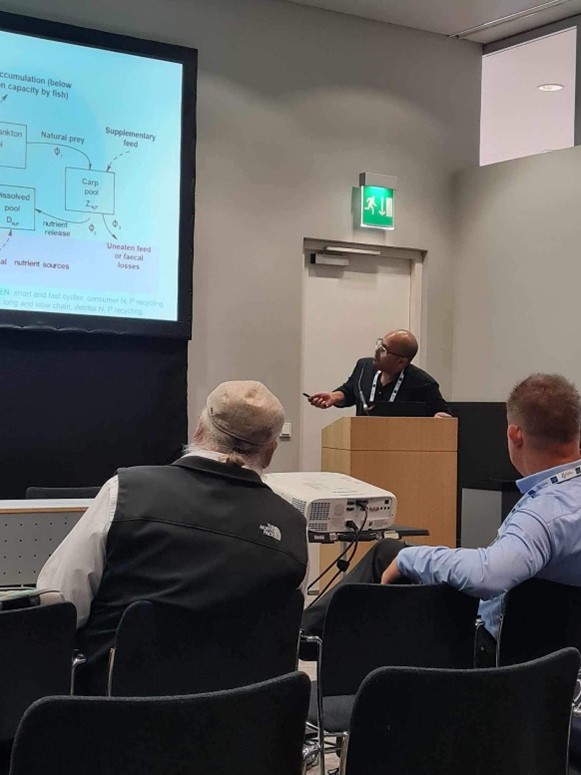
The annual international conference organized by European aquaculture society (EAS) was held in Vienna, Austria from September 18 - 21, 2023. Dr. Koushik Roy, under the patronage of Prof. Zdenek Adamek and Alistair Laine, participated in the capacity of a session chair. He chaired the session themed “Nature-based Solutions and Eco-intensification in Aquaculture”. Where he chaired seven oral presentations, including one oral presentation of his own which was honorarily chaired by Prof. Bela Urbanyi (MATE, Hungary). A stimulating discussion around the future of pond aquaculture also occurred, following oral presentations by Hungarian (Ferenc Levai, Bela Urbayi), Czech colleagues (Lenka Kajgrova, Koushik Roy) and an IUCN representative (Raphaela le Gouvello) in the session.
Photo courtesy: Prof. Pavel Kozak.
- Fotogalerie:
- Foto:
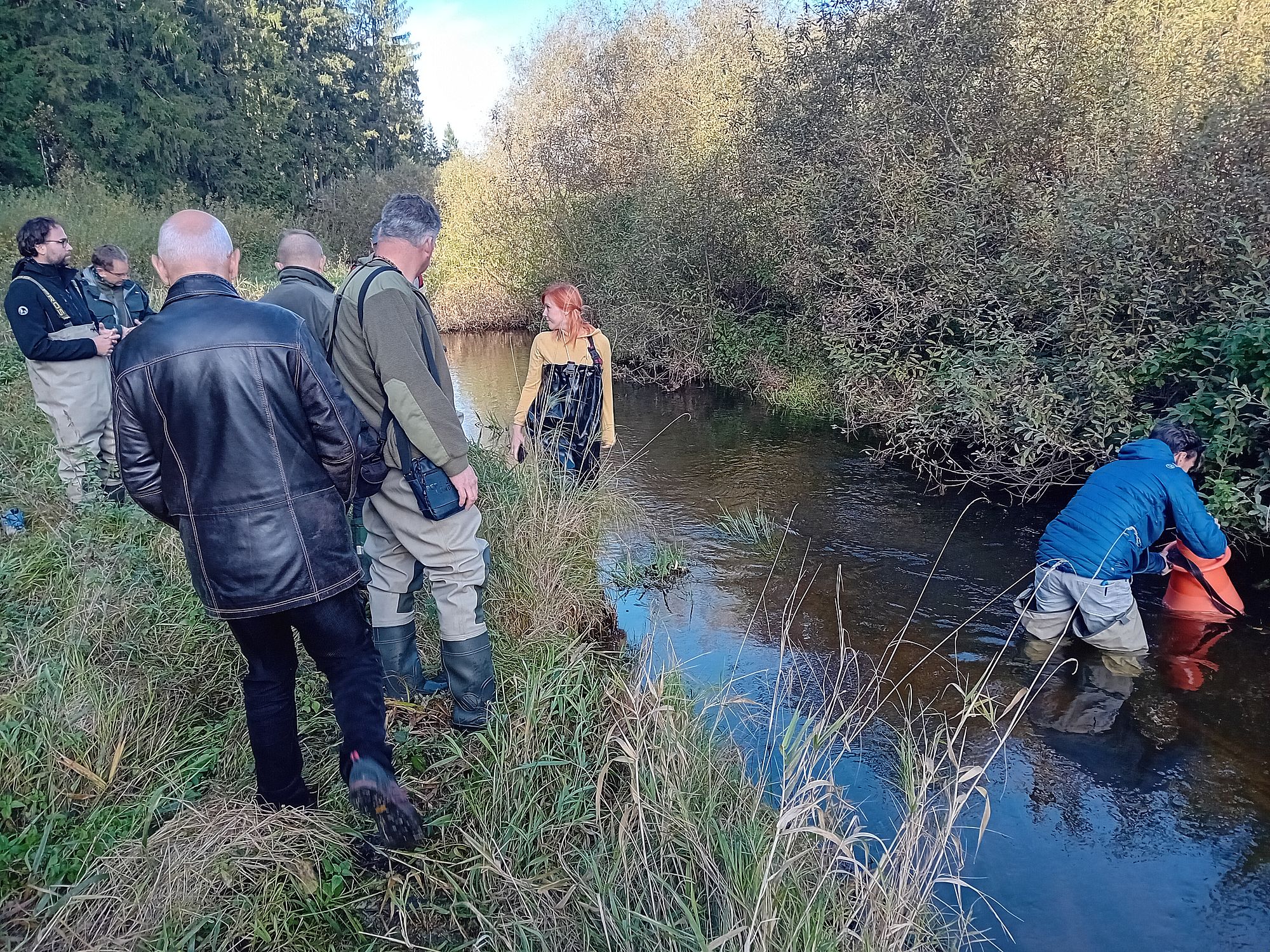
- Foto:
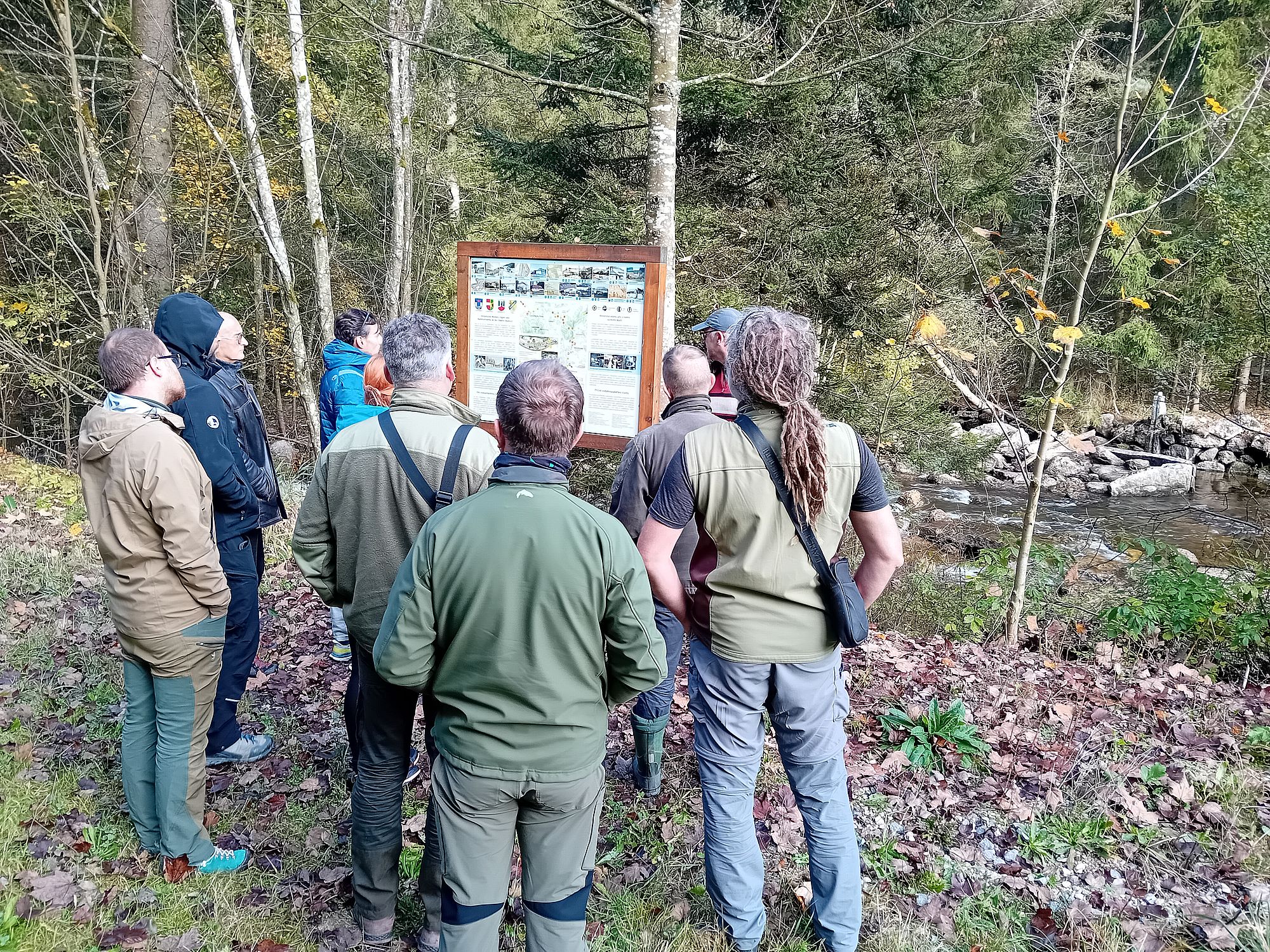
On 17th October 2024, Bořek Drozd, together with the participants of the practical seminar "Fisheries management and water protection in the Czech Republic", which was organized by FFPW USB within the integrated LIFE project Living Rivers (101069837/LIFE21-IPE-SK-Living Rivers), visited the revitalized parts of the upper course of the Malše river in Austria. The excursion was led by Robert Ouředník (Bivalvia company). The participants had the opportunity to get to know an example of good practice in the opening of cross-border streams (CZ-AU) and also had a unique opportunity to look into the life of a critically endangered bivalve -the freshwater pearl mussel.
On 5th February 2025 a joint meeting of the LIFE Living Rivers (101069837/LIFE21-IPE-SK-Living Rivers) and LIFE Boat4Sturgeon projects took place at the Bodenkultur Universität (Vienna, Austria) at the invitation of Dr. Thomas Friedrich. The meeting was also attended by staff of the Slovak Angling Union (Ing. M. Farský and Ing. F. Miklánek) and Dr. Maroš Kubala from the Water Research Institute in Bratislava as a representative of the Living Rivers project coordinator. Dr. Bořek Drozd, Dr. Filip Ložek and Dr. Martin Šindler spoke on behalf of FROV JU. The objectives of the MonStur project (project leader at BOKU: Dr. Jakob Neuburg) and the results and progress of both LIFE projects were presented at the meeting. An important part of the meeting was the discussion and coordination of the work procedures for the duration of both LIFE projects in order to avoid mutual interference reducing the results of both projects. Furthermore, the principle of sharing data resulting from both projects in the European context was discussed. Finally, a tour of the unique floating fish farming facility for the production of the stocking material of the Danubian sturgeons, newly built within the Boat4Sturgeon project on a disused river barge on the Danube right in the centre of Vienna, was organised.
Written by: RNDr. Bořek Drozd, Ph.D.
On 11/11/2024, Jiří Koleček and Filip Ložek visited our colleague doc. Christoph Hauer (BOKU WIEN) and together they consulted pilot activities focused on rheophilic fish species in the project ATCZ00180 – Living Treasures.
Dr. Marek Šmejkal from BC AS CR – HBU also participated and consulted his pilot action focused on Carassius Carassius.
In addition to the discussion of the exact focus of the upcoming events, we visited the targeted localities on the river Gr. Mühl. Thank you for supporting the INTERREG program Austria-Czech Republic 2021-27.
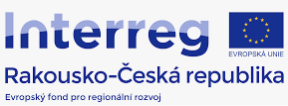
From January 31st to February 2nd, 2025, an exhibition called Fishing Festival 2025 took place in Wels, Austria. The Faculty of Fisheries and Protection Water USB presented itself in this interesting and nearby region for the first time. In addition to the presentation of the faculty and the study, the faculty stand also included a presentation of the AquaCycle project (INTERREG VI-A Austria - Czech Republic 2021 - 2027), the main goal of which is to develop measures to reduce emissions with a special focus on recirculating aquaculture systems (RAS).
Written by: Václav Nebeský
From 23rd to 25th September 2024, a field trip to Austria was organized for students of the third year of the High School of Fisheries in Vodňany. In general, 12 different places were visited both in the Czech Republic and especially in Austria. These included farms with intensive fish farming - RAS, salmonids farming, but we also saw various activities aimed at revitalising smaller and larger rivers, as well as specialised schools and an educational centre. In particular, the visit to the BEST partner institution in Tulln was very inspiring, where we learned more about the latest trends in nutrient recycling, not only in aquaculture. A total of 28 students and two teachers as chaperones attended the event. The whole event was organized by Dr. Ján Regenda, who also accompanied the excursion. The trip was realised and financially supported within the project ATCZ00002/AquaCycle, Reduction of emissions in aquaculture through sustainable use of runoff water and nutrients, Interreg Austria-Czech Republic 2021-2027.
On 9 May 2025, I attended the launch of the "Globally Important Agricultural Heritage Systems (GIAHS)" under the auspices of the FAO. The subject of this prestigious protection is carp farming in ponds in the Lower Austrian region of Waldviertel. The event brought together over 300 guests, mainly from Austria, but representatives from Hungary, Romania, Germany and the Czech Republic were also invited.
This event is a significant milestone in the perception of the importance of fish farming in the Waldviertel region, which, according to the chronicle of the Zwettl Monastery, has a history of over 900 years. It was a great honour for me to participate in the event and to represent the Czech fishery tradition and our faculty.
On 18 and 19 May 2025, I attended the KOCH.CAMPUS gastronomic event "Achtung!, Karpfen". It was a presentation of dishes prepared from local Waldviertel carp. KOCH.CAMPUS is a loose association of top chefs and local food producers that develops Austria's culinary heritage. Every year it organises four thematic events in different locations in Austria. At these events, top chefs and local producers present dishes made with local ingredients to the scientific community. It is a combination of traditional ingredients, recipes and modern techniques. Simply top gastronomy.
This year's second meeting took place on the banks of the new Josefsthaler Teich pond near the Czech border in Litschau. Four Michelin-starred chefs (Andreas Herbst; Hubert Wallner; Michael Kolm and Lukas Nagl) presented their culinary skills at four stations. They worked mainly with carp and other local products. The traditional local carp was adapted in various ways and was also inspired by foreign cuisine. At one of the stations, I demonstrated the filleting of carp and the method of breaking Y bones. Next to me, Lukas Nagl presented two years of dried carp meat prepared in the "Katsuobushi" method and other interesting variations of carp inspired by the cuisine of the Land of the Rising Sun.
I was invited to the event by the organizers Amelia and Francesco Seilern-Aspang from Litschau Castle. As the organizers paraphrased: We live in a time when regionality, sustainability and healthy food are ubiquitous. These ingredients of modern gastronomy should not really be done without carp. A very successful event brought a lot of inspiration and contacts for further cooperation and development.
More information: https://www.art-redaktionsteam.at/de/pressenews/karpfen-ein-fisch-wird-beim-koch-campus-geadelt
On November 5th 2024, together with Martin Bláha, we presented the draft of the project BYCZ04-184 – REWMA (INTERREG Bavaria – Czech Republic), Resilient Waters: Management of Aquatic Invasions for Sustainable Ecosystems. The draft was discussed with colleagues of TU München, Fachberatung für Fischerei – Bezirk Niederbayern and other invited experts from the fields of Ecology, Aquaculture and Astacology, especially from Lower Bavaria. The comments of colleagues from the Bavarian side are very essential for the work of the project team on the German side of the program area.
Written by: J. Koleček
On 21st October 2024 we participated in the second Workshop within the new bilateral project BYCZ-SPF00088 Fish Welfare Education - Přenos znalostí a inovace v rybářských vědních oborech, which is supported by the Small Projects Fund of the Interreg Bayern-Czech Republic programme. The programme of the workshop focused on the issue of fish predators. The Czech side presented the current situation with the problem of the fish predators in the Czech Republic and presented the results of the NAZV project, which allow automated counting of fish predators based on image records. The Bavarian side informed about their situation with fish-eating predators and at the second part of the workshop showed different ways of protecting fish farms against the incursion of fish-eating predators in order to prevent damage.
- Fotogalerie:
- Foto:

- Foto:

- Foto:

- Foto:

- Foto:

- Foto:

- Foto:

- Foto:

On 3rd December 2024 we participated in the third Workshop within the bilateral project BYCZ-SPF00088 Fish Welfare Education - Knowledge Transfer and Innovation in Fisheries Science, which is supported by the Small Project Fund of the Interreg Bavaria-Czech Republic Programme. The workshop programme focused on fish welfare issues in the reproduction of salmonids and fish handling in general. The Czech side presented the current situation with the problems of fish sales in the Czech Republic, which is mainly carried out in live state (wholesale and retail). This brings some specific risks in terms of fish welfare. The Bavarian side demonstrated the problems of fish handling during artificial spawning from the point of view of fish welfare, incubation of fish eggs and rearing of salmonid fry, including a practical demonstration of specific working procedures and technological elements. In the afternoon, we travelled to the Czech Republic where the programme continued with a tour of the RAS salmonids farm at Pstruhařství Mlýny. Discussed were mainly the differences of fish handling in traditional flow-through farms and in modern indoor RAS.
On 14th March 2025 we participated in the fourth Workshop within the bilateral project BYCZ-SPF00088 Fish Welfare Education - Knowledge Transfer and Innovation in Fisheries Science, which is supported by the Small Project Fund of the Interreg Bavaria-Czech Republic Programme. The workshop programme was this time focused on the issue of fish welfare in pre-spawning preparation and selection of broodstock. The fish on which the issues were demonstrated was the grayling (Thymallus thymallus), which usually spawns in mid-April. The Czech side presented suitable methods for assessing the quality of gametes under hatchery operating conditions. In the afternoon, there was a practical demonstration of manipulation of brood fish, their sexing and assessment of their readiness for spawning.

On May 13, 2025, I made a short, one-day visit to the Lindbergmühle farm in Bavaria, where we are implementing the bilateral project BYCZ-SPF00088 Fish Welfare Education - Knowledge Transfer and Innovation in Fisheries Science, which is supported by the Small Project Fund of the Interreg Bavaria-Czech Republic Programme.
My trip was aimed at reflecting on our cooperation on the project so far and preparing further joint activities for 2025. I also saw with interest the newly installed electric fence around two selected ponds to protect their fish stock from fish-eating predators. This is a somewhat unconventional but reportedly very effective installation method that will be tested on the farm for the first time. In addition to the effectiveness in preventing fish losses, the economics of operating the fence will also be monitored, particularly in terms of ensuring its functionality - grass cutting. Human labour, or the time spent on this activity, has a price.
On 3 and 4 April 2025 we participated in the fifth Workshop within the bilateral project BYCZ-SPF00088 Fish Welfare Education - Knowledge Transfer and Innovation in Fisheries Science, which is supported by the Small Project Fund of the Interreg Bavaria-Czech Republic Programme. The programme of the workshop included an introductory theoretical lecture on the influence of water temperature and light regime on fish recruitment and the influence of water quality on fish reproduction in general. In the second part of the workshop, a practical demonstration of different methods of artificial fish spawning and of the grayling was given. Particular attention was paid to the assessment of male sperm quality and the possibility of increasing sperm motility by using fertilization solutions.

Internship at the Permanent Representation of the Czech Republic to the European Union (12.2–12.4.2024)
During my two-month internship at the Permanent Representation of the Czech Republic to the European Union in Brussels, I worked under the supervision of Tomas Vacenovsky and Vera Kohoutkova in the Department of Agriculture and Environment. The goal of the internship was to gain practical experience in the field of European Union policy. I enhanced my knowledge and skills in communication, organization, language proficiency, and teamwork. I also became familiar with the functioning of the European Union and its communication processes. Additionally, I actively contributed to policy analysis and discussions related to aquaculture in the EU. The insights gained will be valuable both for my research activities and for collaboration with Czech partners in the field of aquaculture.
31st October 2023, a networking meeting of the LIFE Living Rivers (101069837/LIFE21-IPE-SK-Living Rivers) and LIFE Boat4Sturgeons projects took place at the Water Management Research Institute in Bratislava (Slovakia). The meeting was attended by FFPW USB staff Dr. Borek Drozd and Assoc. Prof. Miloš Buřič. At the meeting, the goals of both projects and the intended activities were introduced as well as mutual cooperation and synergy in the performance of project tasks within the Danube River basin were discussed.
RNDr. Bořek Drozd, Ph.D.
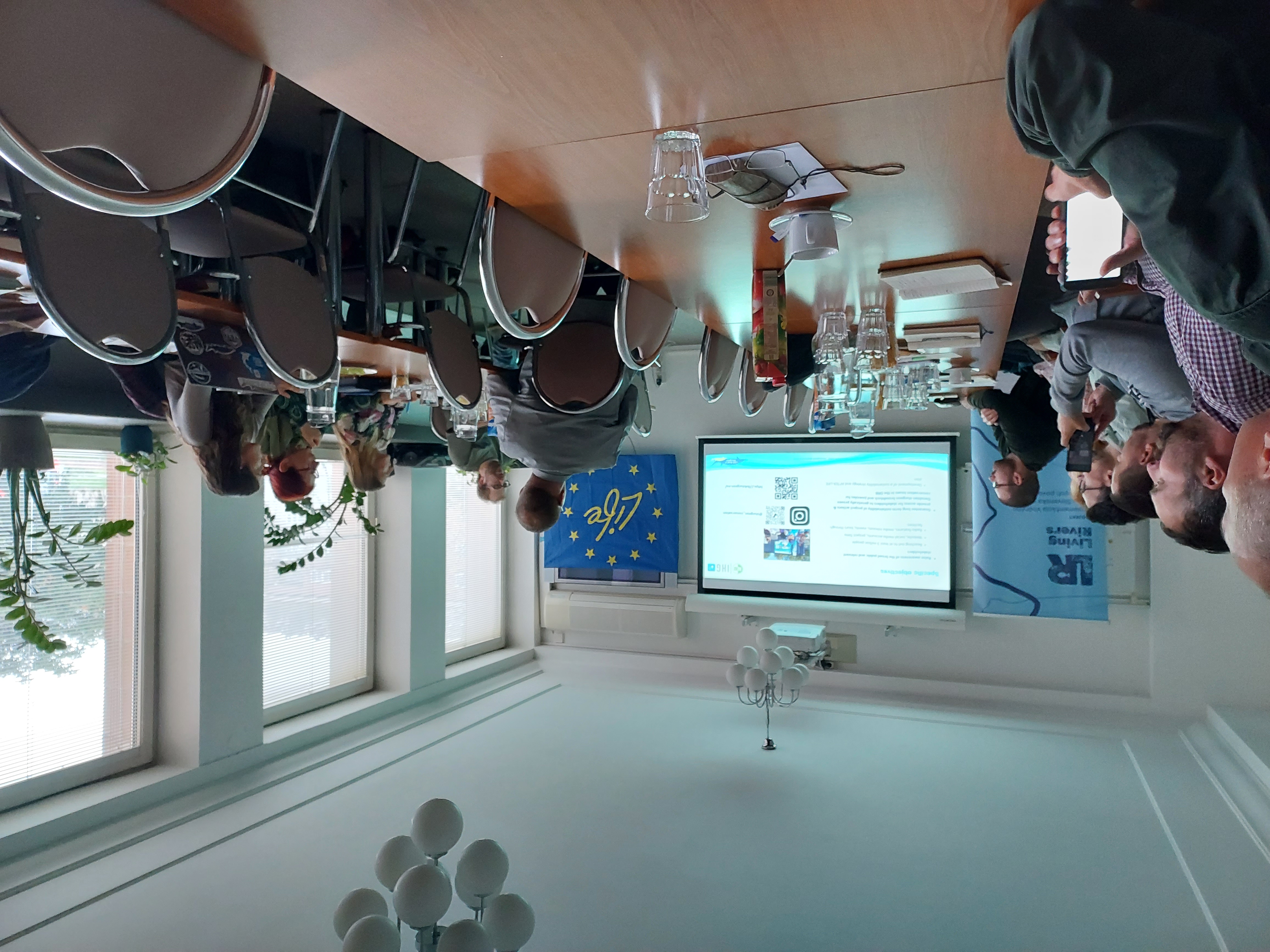
From November 26 to December 6, 2024, the Vice-dean for International Relations - Assoc. Prof. Martin Pšenička, within the framework of the international project of the GAČR (22-31141J) focused on fish reproduction in relation to global warming, visited Brazilian colleagues at São Paulo State University. During his stay, he visited laboratories in São Paulo, Botucatu, and Ilha Solteira.
From September 8th to 14th, 2024, through the ERASMUS+ program and with the support of the University of South Bohemia, we had the opportunity to gain insight into the workings of the University of Las Palmas de Gran Canaria, specifically the Instituto Universitario de Oceanografía y Cambio Global (IOCAG). During the week-long program, we toured the laboratories, became acquainted with the ongoing experiments, the workings of project management and administration, and visited all departments of the institute.
Written by: Adéla Minaříková, Michaela Vazačová



















